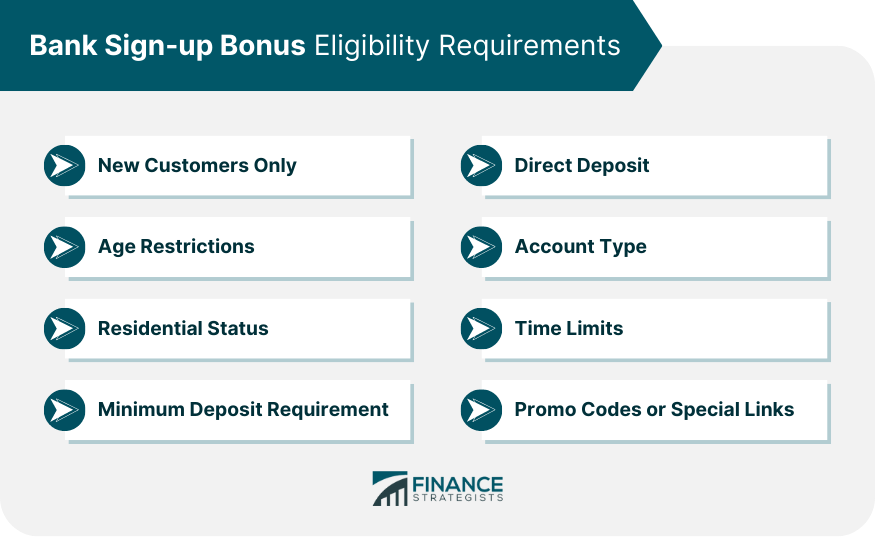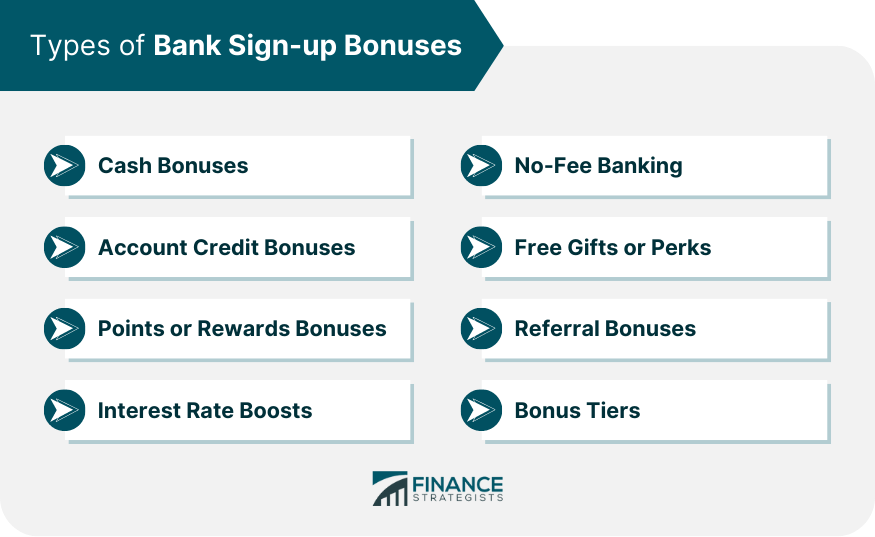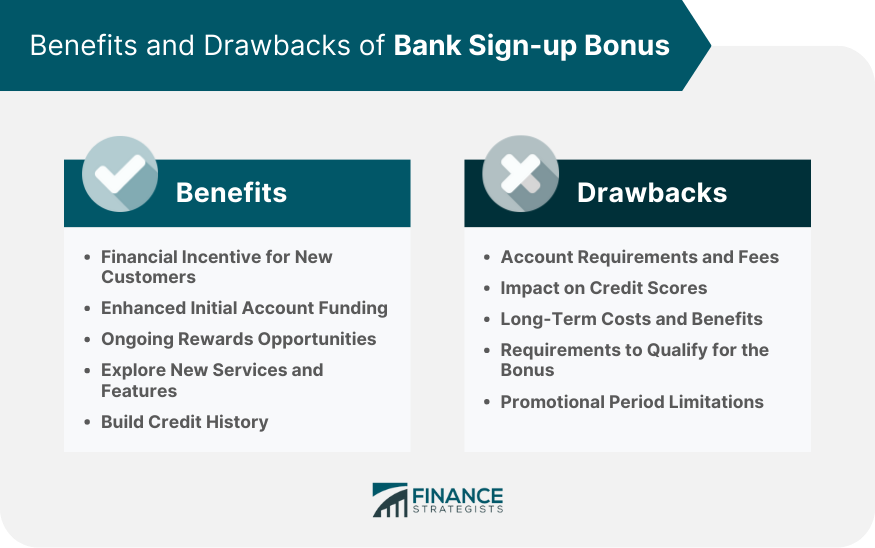A bank sign-up bonus is a promotional offer presented by financial institutions to entice new customers into opening a fresh account with them. These bonuses are designed to be attractive and can take different forms, such as enticing cash rewards, account credits that boost the initial account balance, or valuable points that can be redeemed for various benefits like gift cards or travel opportunities. By offering these incentives, banks aim to stand out from their competitors and draw in a larger customer base. These sign-up bonuses are not only advantageous for banks but also present an exciting opportunity for individuals seeking to establish a new banking relationship. The prospect of receiving a bonus upon opening an account can be highly motivating, encouraging customers to explore the unique features and services the bank has to offer. To be eligible for a bank sign-up bonus, prospective customers must meet specific requirements set by the bank. Eligibility criteria may vary depending on the bank's promotion and the type of sign-up bonus offered. Common eligibility factors include: New Customers Only: Most sign-up bonuses are exclusively available to new customers who have not held an account with the bank previously. Existing customers or those who have closed an account and reopened it may not be eligible for the bonus. Age Restrictions: Some sign-up bonuses may have age restrictions, requiring applicants to be of a certain age to be eligible. Residential Status: The availability of sign-up bonuses may be restricted to specific countries or regions. Banks may limit bonuses to residents of certain states or provinces where they operate. Minimum Deposit Requirement: To qualify for the bonus, customers may need to deposit a specified amount of money into the new account. This deposit serves as a commitment to the bank and its services. Direct Deposit: Many sign-up bonuses require customers to set up direct deposits into the new account. This ensures the account is used for regular income and active transactions. Account Type: Certain bonuses may only be available for specific types of accounts, such as checking or savings accounts. Customers should verify that the bonus applies to the account they wish to open. Time Limits: Customers must meet all bonus requirements within a specified time frame after opening the account. This period can range from a few weeks to a few months. Promo Codes or Special Links: Some bonuses may require customers to use a specific promo code or a unique link during the account opening process to activate the bonus offer. Bank sign-up bonuses come in various types, each offering unique rewards and incentives to attract new customers. The types of bank sign-up bonuses include: Cash Bonuses: A popular type of sign-up bonus where the bank rewards customers with a specific amount of money upon meeting the eligibility criteria. Account Credit Bonuses: This involves the bank providing customers with credit to their account instead of a cash reward. Points or Rewards Bonuses: In this type of bonus, customers earn points or rewards for opening a new account and fulfilling specific account activities. Interest Rate Boosts: By opening an eligible account and meeting certain requirements, customers may receive a higher interest rate on their savings or checking account balances for a limited period. No-Fee Banking: Certain sign-up bonuses waive account maintenance fees or other charges for a specified period. This incentive allows customers to enjoy fee-free banking, providing them with a cost-saving advantage. Free Gifts or Perks: Banks may offer free gifts or additional perks as part of their sign-up bonuses. These gifts could include items like branded merchandise, electronics, or vouchers for exclusive services. Referral Bonuses: Some banks reward existing customers for referring friends or family members to open new accounts. Bonus Tiers: Certain sign-up bonuses come in tiers, where the rewards increase based on the customer's level of account activity. Bank sign-up bonuses offer a range of compelling advantages that make them an attractive option for customers. Some of the key benefits include: The promise of a cash reward or points upon account opening serves as a powerful incentive for individuals seeking to establish a new banking relationship. This enticement can make customers more receptive to exploring the bank's services and features, leading to potential long-term loyalty. To qualify for the bonus, customers are often required to deposit a specific amount of money into the new account. This initial funding provides customers with a head start, enabling them to begin their banking journey with a more substantial account balance. The boosted funds can be particularly advantageous for managing everyday expenses, emergency funds, or even setting aside money for future financial goals. Beyond the initial sign-up bonus, some banks offer additional rewards for specific account activities. These ongoing rewards can take the form of cashback on purchases, interest rate boosts on savings accounts or even bonus points for regular transactions. Such perks provide continuous value to customers, enhancing their overall banking experience and reinforcing their decision to choose the bank. Customers may discover additional benefits, such as high-interest savings accounts, investment opportunities, or special banking tools that cater to their unique financial needs. This exploration process can lead to a deeper understanding of the bank's offerings and foster a more comprehensive banking relationship. For individuals starting their financial journey or seeking to build their credit history, responsibly managing a new bank account opened for a sign-up bonus can have positive implications for their credit score. Timely payments and responsible account management can contribute to establishing a favorable credit history, which may benefit them in future financial endeavors. While bank sign-up bonuses offer attractive benefits, customers should be aware of potential drawbacks associated with these offers to make informed decisions. Some of the drawbacks include: To maintain eligibility for the sign-up bonus and avoid service charges, some banks may require customers to maintain a minimum account balance or meet specific transaction criteria. Failing to meet these requirements could result in account fees that offset the value of the bonus, making it essential for customers to understand and fulfill the bank's account requirements. While opening a new bank account typically doesn't have a significant impact on credit scores, the process may involve a credit inquiry. This inquiry can cause a minor temporary decrease in credit scores. Additionally, managing multiple bank accounts may affect the credit utilization ratio, which is a factor influencing credit scores. Customers should consider these implications before opening multiple accounts solely for sign-up bonuses. Beyond the initial promotional period, customers should carefully evaluate the account's features and fees. If the account's benefits and services do not align with the customer's financial needs, the costs of maintaining the account solely for the sign-up bonus may outweigh the initial reward. Evaluating the account's suitability for long-term use is essential to ensure the banking relationship remains beneficial beyond the promotional period. Some sign-up bonuses may have stringent requirements, such as high minimum deposit amounts or specific transaction thresholds, which may not be feasible for all customers. Customers should assess whether they can comfortably meet the bonus requirements before committing to a particular bank's offer. Customers must fulfill all bonus requirements within a specified time frame after opening the account. Depending on the promotion, this period can be as short as a few weeks or extend to a few months. Failing to meet the deadline may lead to the forfeiture of the bonus, so customers should plan their account activities accordingly. Bank sign-up bonuses serve as powerful incentives for attracting new customers to financial institutions. These promotions offer an array of benefits, including cash rewards, account credits, and points, motivating individuals to explore and establish a new banking relationship. By requiring customers to meet specific eligibility criteria, such as maintaining a minimum account balance or setting up direct deposits, banks ensure active engagement with the new account. The initial boost to account funding provides customers with a favorable starting point for managing their finances, while ongoing rewards enhance the overall banking experience. However, customers should be aware of potential drawbacks, such as account requirements and fees, and the potential impact on credit scores. By carefully reviewing the terms, customers can make the most of these sign-up bonuses and embark on a rewarding financial journey with their chosen bank.What Is a Bank Sign-up Bonus?
Bank Sign-up Bonus Eligibility Requirements
For example, individuals under the age of 18 may not qualify for certain bonuses independently and may need a parent or guardian as a joint account holder.
Types of Bank Sign-up Bonuses
The cash reward is typically deposited into the new account after fulfilling the requirements, providing customers with immediate financial benefits.
This credit can be used to cover various account-related expenses, such as monthly fees or transaction charges, making it a valuable benefit for account holders.
These points can be redeemed for various benefits, such as gift cards, travel rewards, merchandise, or even cash back, providing customers with flexibility in utilizing their rewards.
Both the referrer and the referee may receive a bonus once the new account is opened and certain requirements are met.
Meeting higher transaction thresholds or maintaining larger account balances can lead to more substantial bonuses.
Benefits of Bank Sign-up Bonus
Financial Incentive for New Customers
Enhanced Initial Account Funding
Ongoing Rewards Opportunities
Exploring New Services and Features
Building Credit History
Drawbacks of Bank Sign-up Bonus
Account Requirements and Fees
Impact on Credit Scores
Long-Term Costs and Benefits
Requirements to Qualify for the Bonus
Promotional Period Limitations

Conclusion
Bank Sign-up Bonus FAQs
A bank sign-up bonus is a promotional offer provided by financial institutions to attract new customers when they open a new account. These bonuses can come in various forms, such as cash rewards, account credits, or points that can be redeemed for benefits like gift cards or travel.
To qualify for a bank sign-up bonus, you typically need to meet specific eligibility criteria set by the bank. These criteria may include maintaining a minimum account balance, setting up direct deposits, completing a specific number of transactions, or making a minimum deposit into the new account.
The timing of receiving the sign-up bonus varies based on the bank's terms and conditions. In many cases, the bonus is credited to your account shortly after meeting all the qualifying requirements. However, it's essential to review the bank's guidelines to know the specific timeline.
No, bank sign-up bonuses are typically reserved for new customers who have not previously held an account with the bank. Existing customers are usually not eligible for the sign-up bonus unless stated otherwise in a specific promotion.
Opening a new bank account for a sign-up bonus usually involves a credit inquiry, which may have a minor and temporary impact on your credit score. However, managing the account responsibly and meeting all the requirements should not negatively affect your credit in the long run.
True Tamplin is a published author, public speaker, CEO of UpDigital, and founder of Finance Strategists.
True is a Certified Educator in Personal Finance (CEPF®), author of The Handy Financial Ratios Guide, a member of the Society for Advancing Business Editing and Writing, contributes to his financial education site, Finance Strategists, and has spoken to various financial communities such as the CFA Institute, as well as university students like his Alma mater, Biola University, where he received a bachelor of science in business and data analytics.
To learn more about True, visit his personal website or view his author profiles on Amazon, Nasdaq and Forbes.











